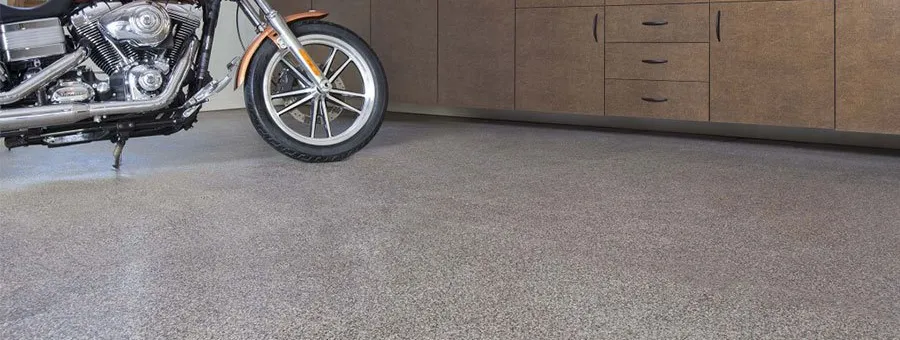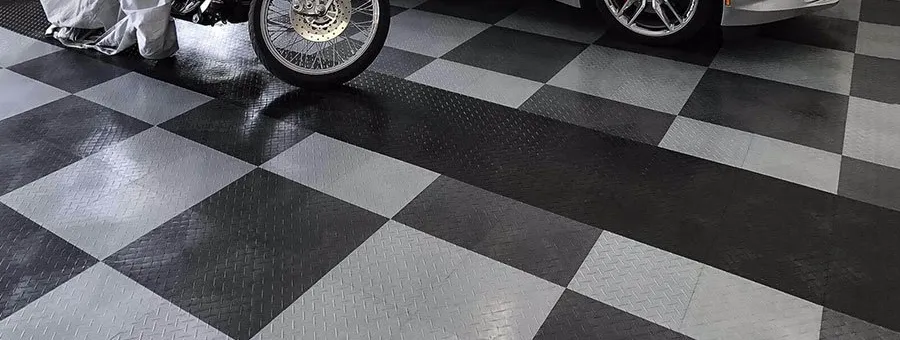June 26, 2024
You spent months debating between all the floor types you could choose for your garage. You’ve narrowed it down to two, epoxy and modular flooring. Besides the look of the flooring, one factor that matters to you is how easily they can be cleaned. Between modular and epoxy, which garage flooring material is the easiest to clean and maintain?
Modular flooring is the easier type of flooring to clean. It does not need to be cleaned nearly as often as epoxy. You can also skip all the constant sweeping, yet still have garage floors that look appealing, modern, and neat.
Keep reading on to discover more about the differences between epoxy and modular garage floors and which type of flooring is easier to clean. You’ll also learn about the many benefits of modular flooring in this article. You’re not going to want to miss it!
What Is Epoxy Flooring?

Let’s begin with an explanation of your first garage flooring material choice, epoxy. Although commonly found in industrial and commercial flooring applications, epoxy would be right at home in your garage as well.
Most epoxy floors have concrete bases, with the epoxy coating poured over the top. The resin-like finish of epoxy is smooth, shiny, and ultra-reflective. It’s also typically quite durable.
That said, you may run into some issues with epoxy. First, if your concrete garage flooring is polished or recently sealed, the epoxy might not stick because it can’t bond.
Secondly, you must watch the temperatures when applying epoxy to garage floors. If the weather becomes too warm, your epoxy might begin outgassing. This is the technical term for the bubbles you see underneath the surface. Worse yet, sometimes the epoxy can peel too!
Thirdly, in some cases, you cannot just pour the epoxy straight over your concrete garage floors. You’d have to use an epoxy primer first and then a finisher coat. The primer is a paint-like substance that takes several hours to dry and sometimes needs a second coat. The finisher can be a slow dryer as well.
These extra steps, while completely necessary, do end up increasing the time it takes to complete your epoxy flooring project.
What Is Modular Flooring?

If you’re looking for a speedier option for your garage floors, modular flooring is it. These floors require no primers, no pouring, and no drying. Modular floors are simply tiles that attach together. When you interlock each one, it gives the impression of new flooring but without the associated time, labor, effort, or extra cost.
Most
modular floors are made of plastic, but other popular materials include rubber and vinyl. You can find modular flooring in all sorts of styles, especially the vinyl variety. For example, you can get floor panels that resemble hardwood but don’t have any of the risks of real wood, like warping, peeling, or softening.
You typically buy
modular flooring by the square foot. Then, you plan the layout you want for your garage floors and get to work.
You should sweep your floors so they’re as clean as possible before you start, especially since you won’t see your bare garage floor again for a while. If your floor is a little uneven in spots, that might be worth repairing so the modular flooring looks its best.
Then it’s just a matter of laying down the tiles where you want them. You can start in the middle of the garage and work your way out to all four corners or begin at one corner and move towards the center. It’s up to you.
Not all modular panels have to be the same color either. Alternating interlocking tiles look especially great!
Which Garage Flooring Is Easier to Clean?
As established in the intro, modular flooring is the simplest to clean.
Epoxy flooring may be made for durability, but it’s not resistant to stains. If you spilled something like wine, for example, you’d have to wipe up that stain right away. Otherwise, you’re at risk for a random corner of your epoxy floors being permanently stained purple or red.
If the same spill happened on a modular floor, okay, no big deal. You don’t have to rush to clean it up if you don’t want to. Even if you wait for hours or until the next day, the stains shouldn’t be too jarring. Plus, you can always just take that tile out and get a new one if the original is especially stained. That’s literally starting with a clean slate.
Another downside to epoxy flooring is how often you have to sweep it. This keeps the surface clean so it can be shiny and bright, so sweeping is quite necessary.
Modular flooring requires far less of your time and effort. You might sweep it once a month instead of once a week, if that.
You can also put off cleaning your modular floors for quite a while, sometimes as long as six months. By that point, if you plug in a Shop Vac and clean the flooring thoroughly, you’re good for another six months. You couldn’t dream of going that long without cleaning epoxy flooring. It would look and feel awful beneath your feet.
Supplemental Benefits of Modular Flooring
Here are some other benefits you can expect with
modular flooring for your garage.
The Freedom to Cover the Whole Floor or Only Parts
Perhaps you can’t envision a full floor covering for your garage. If so, then modular flooring suits you especially well. You can install the tiles wherever you want them, such as to make a runway across your garage, around the border of the space, or in small sections.
Should you want to cover the whole floor, you can do so as well with
modular flooring. Compare that to epoxy, in which you must cover the whole floor or none at all. You can’t pick and choose the areas that need the coating most.
Quick and Easy Installation
Even if you could skip applying the epoxy primer and finisher, you would still have to mix the epoxy in a two-part process. Then there are the drying times. You would be spending most of your day sitting around, twiddling your thumbs.
If you’re short on time, waiting for all your epoxy to dry can be agonizing. Yet using the flooring before the epoxy dries will ruin the final result, so you have no choice but to be patient.
Well, unless you opt for modular flooring instead.
Modular flooring neither mixes nor does it have to be dry. If you only have an hour or two to spare, you should have your garage flooring project about finished by then, if not completely done.
Design Customization Freedom
Another perk of modular flooring is that you can easily remove the tiles anytime you want, to change up the look of your garage inexpensively.
That’s not the case with epoxy. Whatever type of look you’re going for, it’s one you should really think about, as you’ll be fixed with it for years. Modular flooring allows you to try new designs in your garage. If you like them, then great! If not, you’re free to keep switching things up until you find a style that suits you.
Conclusion
Modular and epoxy are two of the most common options for home garage flooring. If you’re torn between the two, you might want to give modular flooring a try. It’s easier to install, cuts out all the time spent waiting for the flooring to dry, and is more affordable. You can also change out your modular tiles, based on your preferences.
Modular floors are also easier to clean and maintain. There’s less risk of staining, and if a tile is looking particularly worn, you can always just change it out for a new one!

